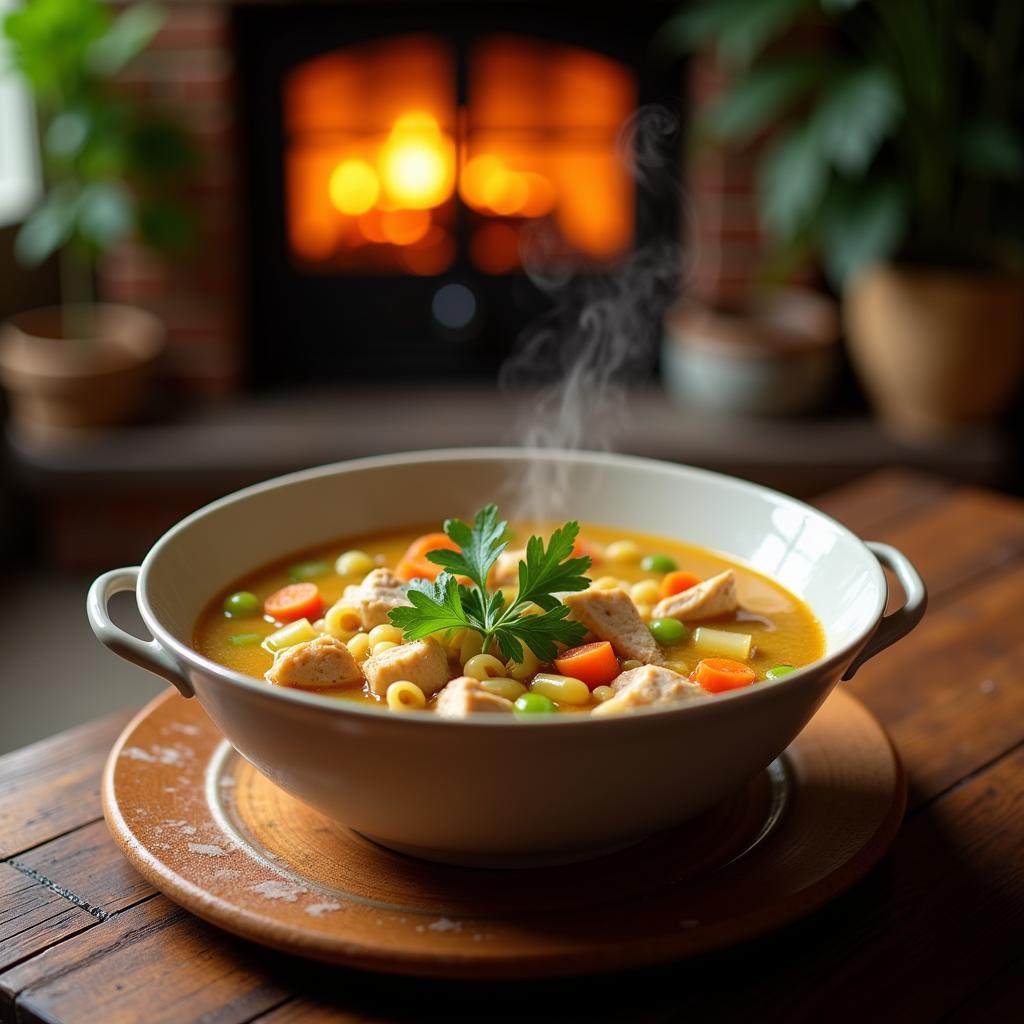Foods Associated With Sentimentality evoke powerful emotions, transporting us back to cherished moments and connecting us to loved ones. Whether it’s the aroma of grandma’s apple pie or the taste of a childhood birthday cake, certain dishes hold a special place in our hearts, transcending mere sustenance to become symbols of comfort, joy, and belonging.
The Psychology of Food and Nostalgia
Why do certain foods trigger such strong emotional responses? The answer lies in the intricate connection between our senses and our memories. Smell and taste are particularly potent triggers, directly linked to the limbic system, the emotional center of our brain. A single bite of a familiar dish can unlock a flood of memories, transporting us back to specific times, places, and people. This nostalgic connection isn’t just about the food itself; it’s about the experiences and emotions we associate with it.
Comfort Food: A Hug on a Plate
When we’re feeling down, stressed, or simply homesick, certain foods offer a sense of comfort and security. These “comfort foods” often hark back to childhood, reminding us of simpler times and the nurturing care of family. Think warm, creamy mashed potatoes, a steaming bowl of chicken noodle soup, or a gooey slice of chocolate chip cookie. These foods aren’t just delicious; they’re emotional anchors, providing a sense of familiarity and stability in a chaotic world.
 A steaming bowl of comforting chicken noodle soup with vegetables and herbs
A steaming bowl of comforting chicken noodle soup with vegetables and herbs
Cultural Influences on Sentimental Foods
Food traditions vary widely across cultures, shaping our individual and collective food memories. What’s considered a comfort food in one culture might be completely unfamiliar in another. For example, in many Asian cultures, a bowl of congee or a warm plate of dumplings might evoke feelings of comfort and home, while in Latin American cultures, it could be a plate of arroz con leche or tamales. These cultural variations highlight the profound influence of our upbringing and shared experiences on our emotional connection to food.
Family Recipes: Passed Down Through Generations
Family recipes are more than just instructions for cooking; they’re repositories of history, tradition, and love. These treasured recipes, often handwritten on stained index cards or passed down orally, carry with them the stories and memories of generations past. Baking grandma’s famous apple pie isn’t just about creating a delicious dessert; it’s about connecting with her legacy and keeping her memory alive.
Holiday Foods and Celebrations
Holidays are often associated with specific foods that evoke strong sentimental feelings. Think Thanksgiving turkey, Christmas cookies, or Easter ham. These foods are more than just festive treats; they’re integral to the celebration, symbolizing togetherness, joy, and the passing of time. The aroma of these dishes can instantly transport us back to childhood holidays, filled with family, laughter, and warmth.
The Power of Sharing Food
Sharing food is a fundamental human experience, fostering connection and creating lasting memories. Whether it’s a family dinner, a potluck with friends, or a romantic meal for two, sharing food strengthens bonds and creates a sense of community. The act of breaking bread together, literally and figuratively, creates a shared experience that deepens our relationships and enriches our lives.
“Food is more than just fuel for the body; it’s fuel for the soul,” says renowned food anthropologist Dr. Emily Carter. “Sharing a meal with someone is a powerful act of connection, creating memories that last a lifetime.”
Recreating Sentimental Dishes: A Taste of the Past
Recreating sentimental dishes can be a powerful way to reconnect with our past and honor our loved ones. Even if the recipe isn’t perfect, the act of making and sharing these dishes can bring us closer to those we cherish. It’s a tangible way to keep memories alive and pass them on to future generations.
Conclusion
Foods associated with sentimentality are powerful reminders of our past, connecting us to cherished memories and loved ones. From comfort foods that offer solace to holiday feasts that celebrate tradition, these dishes play a vital role in our emotional lives. By understanding the psychology behind our food memories, we can appreciate the profound influence that food has on our sense of self and our connection to others. So, the next time you take a bite of a familiar dish, savor not only its flavor but also the memories and emotions it evokes.
FAQs
- What are some common examples of comfort foods?
- How do cultural influences affect our food memories?
- Why are family recipes so important?
- What role does food play in holiday celebrations?
- How can I recreate sentimental dishes?
If you need further assistance, please contact us at Phone Number: 02437655121, Email: [email protected] Or visit us at: 3PGH+8R9, ĐT70A, thôn Trung, Bắc Từ Liêm, Hà Nội, Việt Nam. We have a 24/7 customer service team.